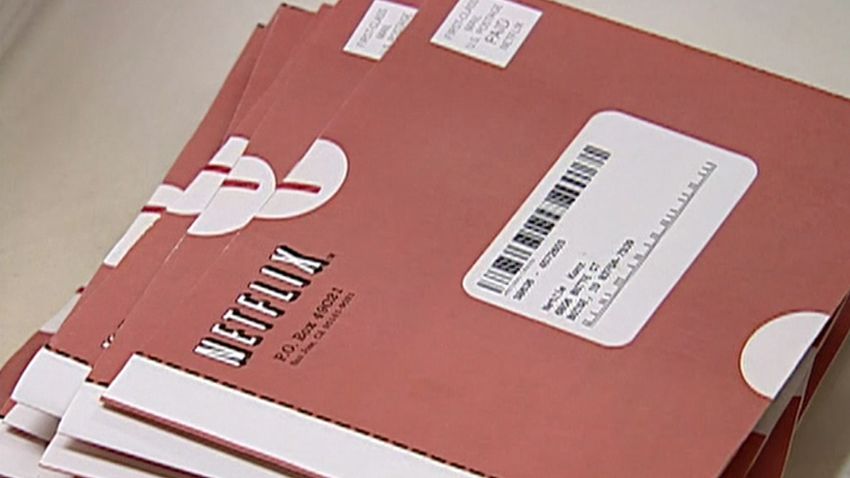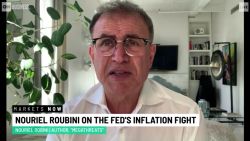A version of this story first appeared in CNN Business’ Before the Bell newsletter. Not a subscriber? You can sign up right here. You can listen to an audio version of the newsletter by clicking the same link.
It wasn’t long ago that Wall Street would have bristled at such grim news out of Netflix: Between April and June, the company lost 970,000 subscribers.
But investors aren’t freaking out about the number of customers bailing from the service. In fact, they’re cheering.
What’s happening: Shares of Netflix (NFLX) are up more than 6% in premarket trading on Wednesday after the company reported its latest results. The simple reason? It could have been so much worse.
“It was a ‘less-bad news is good news’ quarter,” analysts at Bespoke Investment Group said in a note to clients.
Breaking it down: Netflix had already pushed expectations as low as it could, projecting that it would lose 2 million subscribers last quarter after shedding 200,000 in the first three months of the year. That created room for a positive surprise.
“We’re talking about losing 1 million instead of losing 2 million,” Chairman Reed Hastings said on a call with analysts. “So our excitement is tempered by the less bad results.”
Netflix’s most substantial subscriber loss came from its biggest market, the United States and Canada, where the streamer said it lost 1.3 million users in the second quarter.
That was offset by increased subscriptions elsewhere, a sign the company’s investment in foreign language programming is paying off. The release of the fourth season of the wildly popular show “Stranger Things” also provided a boost.
Looking ahead: Netflix still has work to do to convince investors that it’s on the right track. Its stock is down almost 67% year-to-date. Other tech firms, like Google parent Alphabet and Facebook’s Meta are off 21% and 48%, respectively. The S&P 500 is 17% lower.
That will mean making major changes to the business. Netflix, partnering with Microsoft, is racing to develop a new lower-priced option that will be supported by ads, an attempt to scoop up customers that are watching their wallets as inflation bites. It’s expected to launch early next year.
It’s also looking at clamping down on password sharing. The company estimated that 100 million households use Netflix but aren’t paying for it directly.
“We know this will be a change for our members,” it told shareholders. “Our goal is to find an easy-to-use paid sharing offering that we believe works for our members and our business that we can roll out in 2023.”
Rich Greenfield, an analyst at LightShed Partners, thinks there’s significant room for Netflix’s pivot to advertising to be a success.
“Netflix’s advertising opportunity is REAL and directly tied to its enormous time spent vs. all other streaming services,” he tweeted.
But engineering this big of a move won’t be easy. Netflix’s entrance into the ad space will be complicated. Competition for viewers among streaming services is tight. And if a large batch of subscribers downgrades to the lower-cost version to save money, it would hurt revenue even as new users sign up.
“We urge caution to the belief that Netflix will be able to use advertising to grow revenue in a vacuum,” Bank of America analysts said in a report published late last month. “The advertising ecosystem is large, complex, costly, and its competitors using ads have a several-year lead on them.”
Crypto is starting to make a comeback. Will it last?
It’s been an absolutely brutal year for investors in bitcoin and other cryptocurrencies.
The numbers: Bitcoin has lost more than half its value in 2022. Now hovering around $23,500, the price of a single bitcoin has plunged more than 65% below last year’s all-time high of nearly $70,000.
The value of all crypto coins has tumbled from about $2.2 trillion at the end of 2021 to just above $1 trillion.
Bitcoin, the world’s top cryptocurrency, makes up about 42% of the total market, but 2022 has been just as terrible for the owners of other crypto-related assets, such as Coinbase. The brokerage’s stock has plummeted 74% so far this year. Shares of rival Robinhood have lost half their value.
That said: There are hopes that the worst for crypto might be over as risk appetite shows early signs of returning to the market, my CNN Business colleague Paul R. La Monica reports.
Bitcoin has gained more than 15% in the past week. Two other top coins have surged even more. Solana is up more than 35% in the past seven days while ether, the second-most valuable crypto, has climbed nearly 45%.
Coinbase has rallied 22% this week. Software company MicroStrategy, which had nearly 130,000 bitcoins on its balance sheet at the end of June, has soared 25%.
Note of caution: The market’s mood has been fickle. The CNN Business Fear & Greed Index has been improving but remains in “fear” territory.
And while major players like exchange FTX are on solid footing, vulnerable firms could continue to come under pressure. Crypto lender Celsius was forced to file for bankruptcy earlier this month.
“We will see a longer-term rally in the digital assets sector, but I wouldn’t get too excited yet,” said Joel Kruger, market strategist at LMAX Group. “This is still an emerging market.”
Twitter scores a win against Elon Musk
Twitter (TWTR) is getting its wish for a speedy resolution as it tries to compel Elon Musk to stick to the terms of their $44 billion takeover agreement.
In an early victory for the company, a judge on Tuesday ruled that the company’s lawsuit should go to a five-day trial in October.
Twitter initially requested an expedited four-day trial in September, looking to limit uncertainty for its shareholders and employees and fallout for its business. Musk’s legal team opposed the motion.
Digging in: The hearing featured sharply worded arguments from both sides, setting the stage for a contentious legal battle. Twitter’s lawyer at one point referred to Musk as a “committed enemy.”
“Musk has been and remains contractually obligated to use his best efforts to close this deal,” said William Savitt, Twitter’s lead counsel. “What he’s doing is the exact opposite. It’s sabotage.”
Musk lawyer Andrew Rossman pushed back, saying that Musk “doesn’t have an incentive to keep this hanging for a long time.” He noted that the billionaire remains one of Twitter’s largest shareholders. Musk’s team had proposed the case go to trial early next year, which it said was still “an incredibly rapid and sensible schedule.”
Investor insight: Twitter shares climbed almost 3% on Tuesday. They’re up almost 16% in the past week, though they’re still well below the price of $54.20 apiece that Musk agreed to in April.
Up next
Alcoa (AA), CSX (CSX), Las Vegas Sands (LVS), SL Green Realty (SLG), Tesla (TSLA) and United Airlines (UAL) report results after US markets close.
Also today: Existing US home sales for June arrive at 10 a.m. ET.
Coming tomorrow: The European Central Bank is expected to begin raising interest rates for the first time in 11 years.























